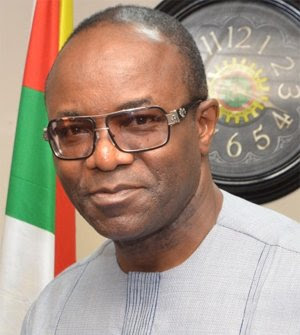Fuel queues end by weekend, says Kachikwu
• NNPC discharges 320m litres of petrol
• Govt may adjust fuel price next month
• Presidency dissolves task force on power sector reform
“Hopefully by tomorrow (today) and Thursday, the fuel queues in Abuja should be over. Hopefully, the same thing will happen in Lagos, and thereafter by the weekend, we should see Kano, Katsina, Sokoto, Port Harcourt and Warri get off the queue list.”
With these words yesterday, the Minister of State for Petroleum Resources, Dr. Ibe Kachikwu, reassured the nation that the lingering fuel scarcity would be a forgotten hardship by the end of the week.
An indication that the minister’s promise may come to pass was that a stock of 320 million litres of petrol was being distributed across the country yesterday.
Meanwhile, the Federal Government has dissolved the presidential task force set up by the Goodluck Jonathan administration to drive the implementation of the reform in the nation’s electricity sector. But the reasons for this move were not disclosed.
Kachikwu said government may review the price of petrol upward next month (May) if the prices of crude oil continued to push up. The minister, who spoke in Abuja when he paid a scheduled working visit to the Petroleum Products Pricing Regulatory Agency (PPPRA), clarified that government had not re-introduced subsidy.
He explained that what had been saved up in the first three months of price modulation in a dedicated account in the Central Bank of Nigeria (CBN) would be used to offset the gap in the price for April.
His words: “Government is funding the price gap we have in April with what has been saved in the last few months of over-recovery. But by May, the prices may be reviewed to march the current trend in the pricing.”
According to Kachikwu, there is no reason Nigeria should not adopt the right policies as hard as they are and as difficult as they come to end the long queues for fuel at the filling stations. The minister also said the queues were expected to end in Abuja and Lagos before the end of the week.
Alluding to why Nigeria must deregulate, Kachikwu explained that there were no queues in some states because the price reflected the actual market price of petrol. “Really, the states do not have queue as such because people are paying double the price to get the product. This is not right but it says that we need to work some statistical logistics to be able to say if we are working the price of our product for people to participate in the chain.”
To stop queues from recurring, Kachikwu explained that Nigeria must bring back strategic reserves that could host between 60 and 90 days sufficiency. “First is the fact that our strategic reserve has not been in place in this country for over 20 years. We need to bring back strategic reserve that is between 60 and 90 days sufficiency so that we can restore fully whenever there is shortage in any part of the country. We also need to find an allocation of resources because, for the first time, I have been able to convince oil majors to allocate forex to the downstream players when they bring in products,” he said.
The Nigerian National Petroleum Corporation (NNPC) said that nationwide petroleum supply and distribution had been ramped up to all states to ensure product availability in the country.
According to the corporation, the supply constraints due to foreign exchange challenges are being resolved through collaboration with the Central Bank of Nigeria (CBN) and major oil marketers.
It added that major international upstream oil companies had also indicated willingness to support major oil marketing companies with some of the required foreign exchange.
NNPC said there had been recovery of Escravos crude line after six years downtime, which is expected to guarantee adequate crude supply to the refineries.
The corporation identified a combination of pre-existing challenges, which resulted in most oil majors completely pulling out from the importation business and NNPC assuming over 90 per cent importation obligation without the necessary logistics put in place.
The Guardian learnt that the government had been spending much to fund the task force on power sector reform without getting commensurate result in terms of fulfilling its mandate.
As at yesterday, the official website and other links to the Presidential Task Force on Power (PTFP) were shut, signalling that all may not be well with the panel.
When the task force was set up, the Federal Government expected it to achieve a modest increase in generation capacity of the existing power stations to about 14,000mw by 2013 and 40,000mw by 2020. But several years after, the nation’s electricity generation continued to hover between 3,000mw and 5,000mw. As at yesterday, power generation in the country dropped from the 5,074mw it recorded on February 2, 2016 to 3,371.85mw, representing a shortfall of 1703mw. The highest generation capacity, which was recorded in February, did not last for more than 24-hours.
As at last week Thursday, eight of the nation’s power generating plants were completely idle, with significant reduction in output from others, including Egbin, which is located in Lagos.
The Guardian learnt that the panel which had functioned for almost six years did not originally have any official terminal date.
Source: Guardian Newspaper.

Comments
Post a Comment